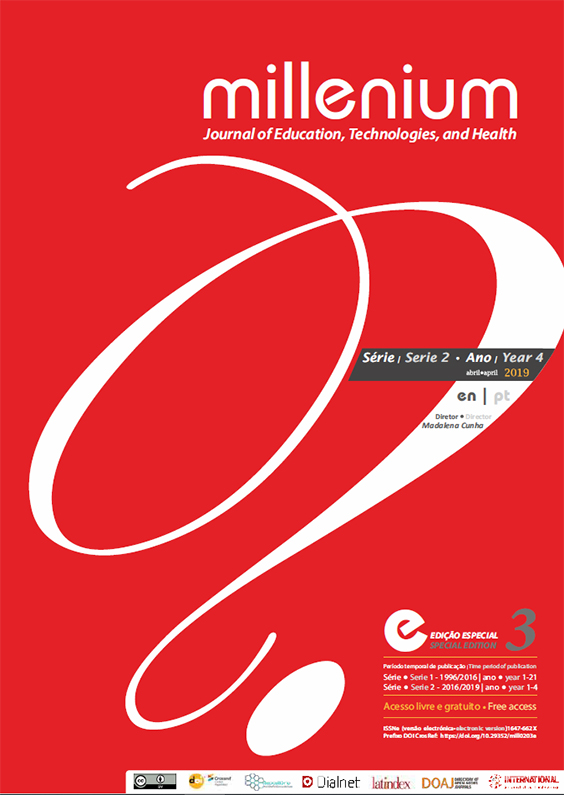Generic and specific competences of the mentor teacher: higher education students perception in the health area
DOI:
https://doi.org/10.29352/mill0203e.03.00187Keywords:
Students, Skills, Supervision, Mentor TeacherAbstract
Introduction: The mentoring process is dynamic, reciprocal and reflexive, hence skills as a disposition to act in a relevant way in relation to a specific situation (Le Boterf, 2003), need to be evaluated in the mentoring processes. The mentor refers to a more experienced professional who guides, teaches, directs, supports and advises a student with less practice, playing an important role on a personal and professional level (Botti & Rego, 2007).
Objetive: To evaluate the perception of the college students about the supervisory skills that need to be obtained by the mentor teacher.
Methods: The cross-sectional descriptive study was carried out on a sample of 306 college students of the health area, of a polytechnic, with an average age of 21.15 years and a higher percentage of women (81.7%). The gathering of Information was supported by the application of Generic, specific and meta-competences of the supervisor scale (Cunha, Cruz, Menezes & Albuquerque, 2017) and Supervisor Core competencies scale (Cunha & Albuquerque, 2017), available online in the academic institution site.
Results: The study allows us to conclude that the most important characteristics necessary for the mentor teacher, for college students, are the supervisor's generic skills (average = 4.36 and SD = 0.47), and personal factors (averagde = 4.83 and SD = 0.46). The supervisor's core competencies predicts the supervisor's generic, specific and meta-competencies skills, explaining their 70% variation. The results support the importance of the assignment of a mentor teacher in college (87.5%), and the monitoring should be effective from the 1st to the 3rd / 4th year (60.4%). They also suggest the preference of daily sessions (51.6%) in the training place (52.4%), lasting less than one hour (49.7%).
Conclusions: The importance of monitoring the pedagogical competences of supervision and mentoring emerges from the study and the results suggest that the students of higher education value the existence of a mentor teacher, so their attribution is pertinent to consolidate the mission all dimensions of pedagogical action.
Downloads
References
Alarcão, I.; Tavares, J. (2007). Supervisão da prática pedagógica: uma perspectiva de desenvolvimento e aprendizagem. 2ª edição, Coimbra: Almedina.
Botti, S., & Rego, S. (2007). Preceptor, Supervisor, Tutor e Mentor: Quais são os seus paspéis? Revista Brasileira de Educação Médica, 32, 363-372.
Costa, N. S. (2012). Formação em Contexto Clínico: a Perspetiva do Estudante de Enfermagem. Porto: Escola Superior de Enfermagem do Porto.
Cruz, S. S. (2012). Do AD HOC a um Modelo de Supervisão Clínica em Enfermagem em Uso. Tese de Doutorado, Universidade Católica Portuguesa do Porto, Instituto de Ciências da Saúde, Porto.
Cunha, M. (Inv.Resp.) (2017). Projeto Supervisão e Mentorado no Ensino Superior: Dinâmicas de Sucesso (SuperES) (REFª: PROJ/CI&DETS/CGD/0005). Obtido de http://www.ipv.pt/ci/projci/5.htm
Cunha, M. & Albuquerque, C. (2017). Core de competências do supervisor. In Cunha, M. (Inv.Resp.) (2017). Projeto Supervisão e Mentorado no Ensino Superior: Dinâmicas de Sucesso (SuperES) (REFª: PROJ/CI&DETS/CGD/0005). Obtido de http://www.ipv.pt/ci/projci/5.htm
Cunha, M., Cruz, S., Menezes, L., & Albuquerque, C. (2017) . Escala Competências genéricas, especificas e metacompetências do supervisor. In Cunha, M. (Inv.Resp.) (2017). Projeto Supervisão e Mentorado no Ensino Superior: Dinâmicas de Sucesso (SuperES) (REFª: PROJ/CI&DETS/CGD/0005). Obtido de http://www.ipv.pt/ci/projci/5.htm
Gaspar, D., Jesus, S. N., & Cruz, J. P. (2011). Motivação Profissinal e Apoio Fornecido no Estágio. Acta Médica Portuguesa, 24, pp. 137-146.
Karkowska, M. et al (2015). O método (modelo) de mentoria entre professores no ensino secundário e superior - número de projeto e de acordo - 2014-1-PL01-KA200-003335. Polónia, Grécia, Portugal, Roménia, Espanha, Turquia.
Le Boterf, G. (2003). Desenvolvendo a competência dos profissionais / Guy LeBoterf; trad. Pam'cia Chittoni Ramos Reuillard. - Porto Alegre Artrned.
Rocha, I. A. (2013). Construção e Validação do Questionário de Avaliação da Frequência de Estratégias de Supervisão Clínica em Enfermagem. Dissertação, Escola Superior de Enfermagem do Porto, Curso de Mestrado em Supervisão Clínica em Enfermagem, Porto.
Severino, M. (2007). Supervisão em Educação de Infância: supervisores e estilos de supervisão. Penafiel: Editorial Novembro.
Silva, C. (2010). Orientação Profissional, mentoring, coaching e counseling: algumas singularidades e similaridades em práticas.
Revista Brasileira de Orientação Profissional, 11(2), 299-309. Recuperado em 12 de abril de 2017, de http://pepsic.bvsalud.org/scielo.php?script=sci_arttext&pid=S1679-33902010000200014&lng=pt&tlng=pt.
Schön, D. A. (2000). Educando o profissional reflexivo – um novo design para o ensino e a aprendizagem. Porto Alegre: Artmed.
Downloads
Published
How to Cite
Issue
Section
License
Authors who submit proposals for this journal agree to the following terms:
a) Articles are published under the Licença Creative Commons (CC BY 4.0), in full open-access, without any cost or fees of any kind to the author or the reader;
b) The authors retain copyright and grant the journal right of first publication, allowing the free sharing of work, provided it is correctly attributed the authorship and initial publication in this journal;
c) The authors are permitted to take on additional contracts separately for non-exclusive distribution of the version of the work published in this journal (eg, post it to an institutional repository or as a book), with an acknowledgment of its initial publication in this journal;
d) Authors are permitted and encouraged to publish and distribute their work online (eg, in institutional repositories or on their website) as it can lead to productive exchanges, as well as increase the impact and citation of published work
Documents required for submission
Article template (Editable format)





